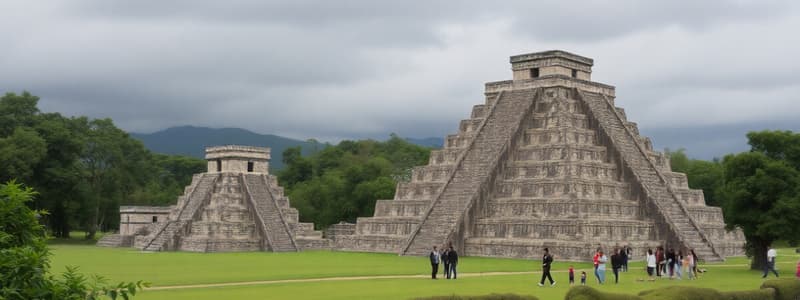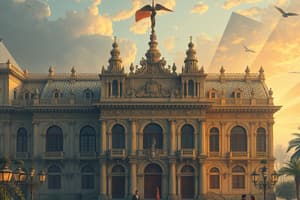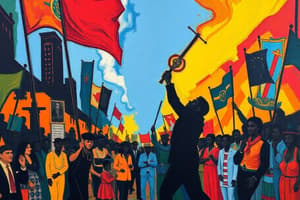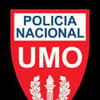Podcast
Questions and Answers
Which civilization is specifically noted for its pottery in Ecuador's pre-Columbian history?
Which civilization is specifically noted for its pottery in Ecuador's pre-Columbian history?
What major authority did the Spanish establish over Ecuador during the colonization period?
What major authority did the Spanish establish over Ecuador during the colonization period?
What factor spurred the desire for independence in Ecuador during the 18th and 19th centuries?
What factor spurred the desire for independence in Ecuador during the 18th and 19th centuries?
What significant outcome occurred as a result of the Spanish colonization in Ecuador?
What significant outcome occurred as a result of the Spanish colonization in Ecuador?
Signup and view all the answers
What characterized Ecuador's modern political history?
What characterized Ecuador's modern political history?
Signup and view all the answers
Which of the following was a major influence on the independence movement in Ecuador?
Which of the following was a major influence on the independence movement in Ecuador?
Signup and view all the answers
What was a direct impact of Spanish colonization on indigenous populations in Ecuador?
What was a direct impact of Spanish colonization on indigenous populations in Ecuador?
Signup and view all the answers
Which agricultural practice was developed by pre-Columbian cultures in Ecuador?
Which agricultural practice was developed by pre-Columbian cultures in Ecuador?
Signup and view all the answers
Study Notes
Pre-Columbian Civilizations
- Ecuador's pre-Columbian history is marked by diverse cultures and societies flourishing in various ecological zones.
- The region's inhabitants interacted with and were influenced by Andean civilizations to the south.
- Notable pre-Columbian groups include the Valdivia culture known for pottery, the Chorrera culture recognized for its intricate ceramic work, and the Inca Empire which exerted significant influence in the highlands.
- These cultures developed sophisticated agricultural practices, social hierarchies, and religious systems.
- Evidence of their presence is found in archaeological sites scattered across the country.
Spanish Colonization
- The Spanish conquistadors arrived in Ecuador in the 16th century, marking the beginning of Spanish colonization.
- They sought to establish control over the region's resources, including gold, silver, and agricultural products.
- The Spanish imposed a system of governance, with the establishment of a viceroyalty as part of the wider Spanish Empire.
- Colonial rule led to the introduction of Catholicism, Spanish language, and European administrative structures.
- Indigenous populations faced forced labor, disease, and cultural suppression.
- The colonial period brought significant demographic changes and cultural transformations.
Independence Movement
- The desire for independence from Spain emerged in Ecuador during the 18th and 19th centuries, spurred by Enlightenment ideals and the successful examples of other Latin American nations.
- The independence movement gained momentum through various rebellions and uprisings.
- Key figures played significant roles in advocating for and achieving independence.
- Ecuador's declaration of independence was proclaimed in 1822.
- The process involved conflict, negotiations, and alliances within the region for independence from the Spanish colonial administration.
Modern Political History
- Ecuador's modern political history is characterized by a series of governments, some democratic and others facing periods of military intervention or authoritarian rule.
- There's been a struggle to achieve stable and democratic rule.
- Political and economic factors impacted policies and influenced political transitions.
- Ecuador has faced social inequalities, economic disparities, environmental challenges, and geopolitical pressures.
- The country has experienced periods of economic growth as well as significant financial crises.
- Contemporary politics includes ongoing discussions around social reforms and economic development.
Cultural Influences
- Ecuador's culture is a vibrant blend of indigenous, Spanish, and African traditions, shaped by past colonization and interactions.
- Indigenous languages and customs are still practiced in various parts of the country.
- Spanish colonial influence is evident in Ecuador's architecture, art, and language.
- Influences from Afro-Ecuadorian and other immigrant communities demonstrate the multicultural diversity of the population.
- Cultural heritage festivals and celebrations showcase the country's traditions.
- These diverse influences are embedded in the country's music, dance, food, and art.
Studying That Suits You
Use AI to generate personalized quizzes and flashcards to suit your learning preferences.
Description
Explore the rich history of Ecuador from its pre-Columbian civilizations to Spanish colonization. Discover the diverse cultures like the Valdivia and Inca Empire and learn about the impact of Spanish governance and resource exploitation in the region. This quiz covers significant archaeological and cultural developments in Ecuador's past.





